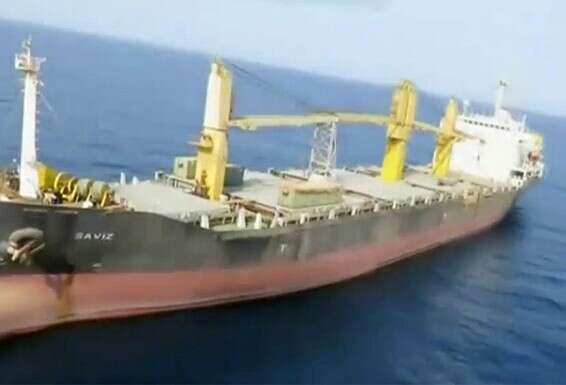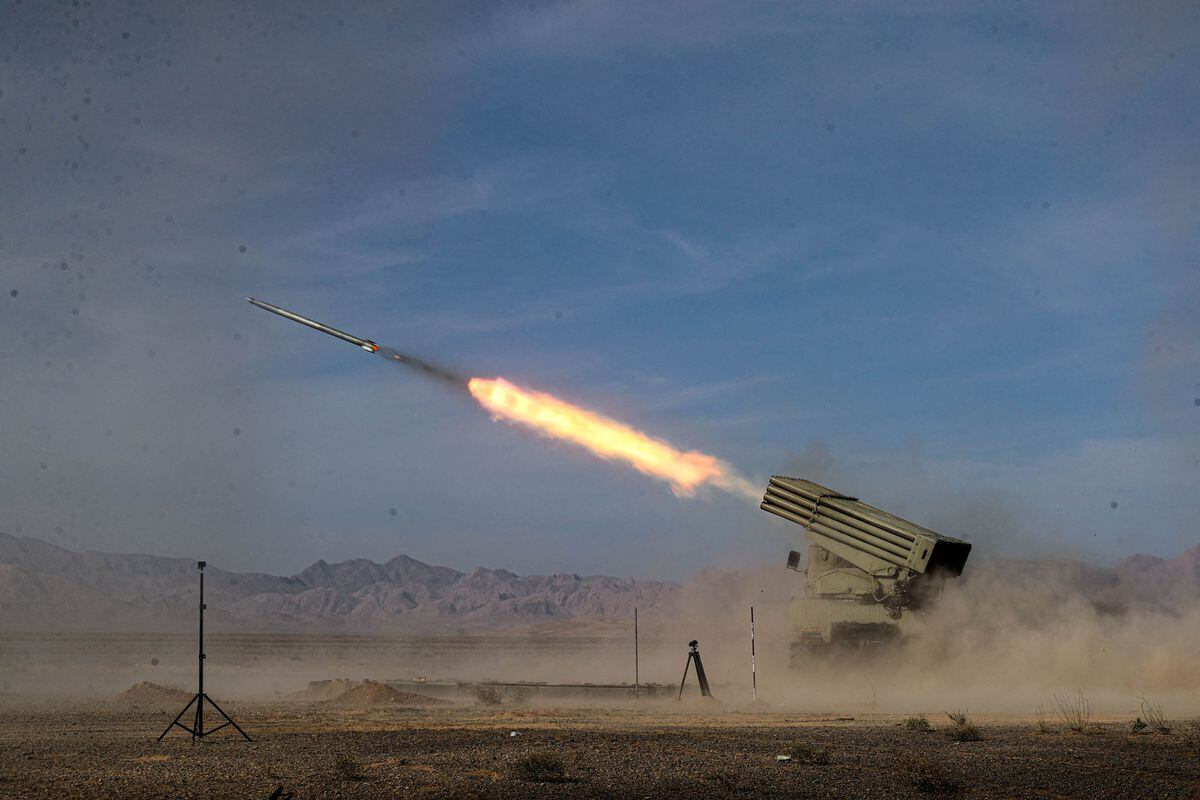According to foreign publications, while in the Kirya in Tel Aviv it was decided to appoint him head of the naval ship, Col. D., commander of Squadron 13, commanded the sabotage operation on the intelligence ship "Sabiz" off the coast of Eritrea • The operation is a product of meticulous intelligence, raising fears of Iranian response • Interpretation
"Given a nautical image, execution is the easy part."
Training of 13th Squadron fighters in 2019
Photo:
IDF spokesperson
On Tuesday morning, the chief of staff convened a discussion insets in his office in the Kirya in Tel Aviv. On the agenda: positions of the navy headquarters, prior to taking office of the new corps commander, David Salama, in early September.
Title role who was manning the head of Naval Operations ( Ramim) in the corps.
Whoever sits in that chair actually runs the entire Navy operation.
The eight candidates are Colonel D., the current commander of Squadron 13 (who will be promoted to the rank of Brigadier General).
If we rely on foreign publications, it can be assumed that at the time the appointment was published, D. was very far from home, and without reception.
For, he commanded the sabotage operation on the Iranian intelligence ship off the coast of Eritrea.
Netanyahu: "An agreement with Iran that will pave the way for nuclear weapons will not obligate us in any way" // Photo: Yad Vashem
It seems that for a long time now no precise armament has been adapted to the purpose as in this appointment.
Under D.'s command, Squadron 13 became a serial contractor for operations.
Apparently, another chapter in the history of the toughest unit in the IDF. In practice, a Nachshoni leap that dramatically increased the naval operational efficiency. In a paraphrase of the 1980s sports program, "Faster, stronger, higher," the flotilla led distant operations More, bolder, and in much shorter periods of time.
This is far from obvious. If we rely, once again, on the foreign media, the fleet has in the last two years acted in more than 20 cases against Iranian targets in the middle of the Bab al-Mandab Straits, in the southern Red Sea. And the Mediterranean Sea.Only sailing to the Straits, near Eritrea, takes 5-4 days, in each direction, and requires complex operational control very far from home and the possibility of rapid intervention.
Silver suitcases for
the Israeli-Iranian naval campaign began to rise in late 2018. This happened a few months after the US withdrew from the nuclear deal, accompanied by crippling sanctions on its economy. In Israel, they noticed that the Iranians had established an oil smuggling route from Iran to Syria. Of their emissaries, especially Hezbollah in Lebanon.
This distinction between mere smuggling and terrorism is important. In the end, it is intended to give legal legitimacy to validity. From the war on terror.
And that is exactly what Iran is doing. The oil is smuggled in civilian ships, and is secretly transported to Syria, where it is taken to the Banias refinery and bought by Syrian businessmen, most notably Hossam al-Qarji. With direct contact with the authorities and a long history of illegal activities, he also brokered, for money, of course, oil and wheat deals between the Assad regime and ISIS.
Al-Qatraji is the main owner of the Arfada Petroleum Private Joint company. Oil infrastructure development contracts in Syria
E, but they are also deep in the list of US sanctions.
They were brought in because of their involvement in the illegal trade in oil: the goods they receive from Iran are bought in cash, and the money bags are transferred to fund the Shiite militias operated by Iran in Syria and Hezbollah in Lebanon.
Since Iran and its envoys are subject to sanctions that prevent Tehran from transferring them current funding in the banking system, harming this route makes it very difficult for Iran to establish itself in the region.
There is no 100 percent success in this war, and it is doubtful whether Israel aimed there.
But various sources have estimated the value of the oil not converted into terrorist money as a result of this Israeli activity at $ 2 billion.
This campaign took place mostly in secret, until recently.
Israel also had no interest in publishing it, so as not to incur a response and open a global front.
But someone in Washington decided to talk.
This seems to have been a signal from the new US administration that it was intended to clarify the borders of the sector to Israel, and especially to prevent it from trying and sabotaging efforts to renew the nuclear agreement with Iran.
Also this week, shortly after the sabotage of the Iranian intelligence ship "Sabiz" off the coast of Eritrea, they knew in Washington that Israel was responsible for the action.
Several publications even linked the execution to the nuclear talks, which began that day in Vienna.
From past experience, it is doubtful that this is the case;
With a high degree of certainty, it can be estimated that the fear of more Iranian attacks on Israeli-owned ships is what determined the timing.
"Saviz" was familiar to anyone operating in the Red Sea sector.
There is no foreign fleet, friendly or less, that has not gathered intelligence on it.
Seemingly an innocent ship, in practice - an advanced reconnaissance ship, manned by Air Force and Navy personnel of the Revolutionary Guards.
For more than three years she moored there, systematically gathering intelligence on every ship, civilian or military, operating in the area.
It is doubtful whether this collection is what bothered Israel.
As mentioned, "Saviz" docked there for years, without being hit.
Its military-intelligence activities were important, but in most cases it is information that can be obtained today in a variety of search engines and websites, which now allow to know almost any information about any ship in the world.
It can be estimated that the injury to her was a signal.
Israel sought to make it clear to Iran that it had exceeded the permitted limits of the sector.
The attack on two merchants owned by Israeli businessmen was, from Israel's point of view, one step too far.
The message conveyed to Tehran was - play with us on the military, not the civilian field.
One has to be naive to think that Tehran will be deterred and will from now on conduct the game according to the rules set by Israel.
When the British stopped a tanker fleeing oil to Syria near Gibraltar in July 2019, the Iranians responded by taking over a British tanker near the Straits of Hormuz.
The British understood the hint, and released the ship.
Since then they have not returned to the subject.
This is probably why Israel is careful to operate only in the secret space.
It was alleged that the oil tankers could be stopped, brought to Haifa or Ashdod, and claimed that it was terrorist financing.
It is likely that the jurists would also have known how to tie the ends to protect this activity in the legal arena.
But they would not know how to protect the many interests of Israelis around the world, who would automatically enter Iranian intent.
Without casualties, without pollution
Iran, as mentioned, does not play by the rules.
When Israel eliminated Abbas Mousavi, a Hezbollah leader who preceded Hassan Nasrallah, in Lebanon in 1992, it received two two-year terrorist attacks in Argentina, the first against the Israeli embassy in Buenos Aires and the second against the building of Jewish communities in the city.
On the face of it, there is no connection between a Jewish community in South America and IDF activity in Lebanon, but Iran does not need the ties. It needs a reason, and an operational opportunity to act.
When Israel presented the SAA with naval operations, the Iranians decided to respond. last month the ship 'Lara Cord. "ostensibly, a cargo ship Standard container Spain; in practice, it is planned to dock intermediate port in Syria, and unload cargo secretive including mixer fuel intended for Hezbollah.
This is a critical component of the project precision missile of the organization, which should allow it to independence A similar mixer was hit in August 2019 by a skimmer attack in Beirut, which was attributed to Israel. This time, too, the Iranians were able to point to the method responsible for the operation, claiming that it was "naval piracy." The
bomber (responsible for most of the operations) is careful to avoid three things: it does not sink the ships, does not harm the crew, and does not cause ecological damage. The latter has been proven
Recently as critical, against the background of the pollution off the coast of the country that was the result of the release of fuels from a commercial ship.
Rumors circulated on social media that the infection was the result of a sabotage caused in the flotilla's operation, but an investigation revealed that this was false information.
The fleet does sabotage ships so they can not continue on their way.
In the past, damage to propellers and engines was reported, and some of the ships were taken out of service.
Other ships have been re-used in a long process, but it is doubtful whether their owners will be happy to put themselves at risk again in the service of the Iranians.
Fear of
a former senior naval
drone
says that such operations require, first of all, accurate intelligence. In recent years, Israel has proven that Iran is very infiltrated, on its soil and in its regional moves. This is reflected everywhere: in actions attributed to the institution in Iran, and the variety of attacks ( Mainly by the Air Force) conducted within the framework of the MMB against the Iranian establishment in Syria and the transfer of weapons to Hezbollah.
Sometimes this intelligence exists in advance, and allows for long combat procedures. Operations of this kind require careful preparations and models. Each ship requires different treatment: where true hurt her world geography, and where the right to harm her physically so that its activity is disabled. it seems that Israel prefers to work in the Red sea, so it maintains constant activity of advanced ships Saar 5 (and sometimes even submarines) that have the ability to high survivability spaces distant.
in other cases , The intelligence arrives at the last minute, and requires quite a few improvisations.The fleet has demonstrated exceptional ability in this area, which allowed it to operate in particularly short combat procedures.Also here, the intelligence component is critical: to hit the fuel mixer accurately it was necessary to know not only which ship it was carrying , But also in which containers
It is exactly one of the hundreds of containers on board.
The next step is the ability to build a marine image.
The Navy is considered one of the most advanced navies in the world in this field, certainly compared to the Iranians.
This capability was built to deal with fleets in wars, but it is applied in the current naval battle.
This allows the Navy to maintain superiority and feel confident even in ranges of action that were once almost science fiction for it.
The execution itself, says the senior, is often the easy part.
Given the intelligence, preparations and accurate naval picture, the fleet has no difficulty in performing.
Certainly when on the other hand there is no military challenge, but a ship whose sleepy crew has no ability or desire to fight, and usually only finds out in retrospect what happened.
Iran, on the other hand, has no such capability.
The naval force of the Revolutionary Guards has demonstrated impressive operational capability in the Gulf region, but it is doubtful whether it is capable of operating thousands of miles from home, and certainly not harming military vessels protected by advanced systems.
Therefore, Iran also reacted against targets that were convenient to it - the mines attached to the walls of a merchant owned by businessman Rami Unger in the Gulf of Oman, and the missiles fired at a merchant partly owned by businessman Udi Angel in the Arabian Sea.
In Israel, it is believed that this is a very weak Iranian response, which indicates a weakness.
A senior official explained that in order to disrupt a country’s shipping, its flag, companies operating under it, goods destined for it or its shipping lanes need to be damaged.
"Iran has done nothing of the sort," he added.
"It hit a car line between the Gulf and Singapore, and a trade line between Africa and India."
It is doubtful whether the Iranian response will amount to that.
As reported yesterday in "Israel Today", the fear is that Iran will also act in other ways, including firing weapons from its territory. Iran has advanced armed drones for ranges of thousands of kilometers, which were already used in September 2019 to severely damage Saudi Arabia's oil infrastructure.
Israel is more protected and the range is longer, but this is a serious threat that requires serious preparation.
Iran has other courses of action.
Brigadier General (Res.) Shaul Horev, former head of the Navy Navy and currently head of the Haifa Center for Marine Policy and Strategy Research and head of the Gulf Aid Center, warns that Iran will respond. "The Navy deserves a big nose for activity, but it is doubtful who decided "At the political level, he took into account all the strategic implications," he says.
"The potential for damage is greater than the potential for benefit," Horev adds. "Whoever signs fuel supply agreements from the emirates to Israel must take into account.
Sailing routes may also be at risk, especially in the Red Sea.
Israel is dependent on maritime trade, and it is doubtful whether the navy has the "SDK and the ability to protect them."
Horev is one of the smartest and most experienced people in the system.
In the past he was also the head of the Atomic Energy Commission, and he knows Iran well, and deeply.
He believes that the campaign against oil smuggling is nearing completion, in light of the agreement that Tehran signed with China and the possibility that the US sanctions on it will be lifted as part of the return to the nuclear agreement.
In his opinion, activities against clear military targets and against arms smuggling - yes, activities against civilian targets - no.
For example, the great confusion that has prevailed in recent weeks in Israeli shipping companies, wondering how much risk they face.
Got an ear in Washington?
In the meantime, this activity continues.
Squadron 13 is at the front, but it is not alone.
The entire navy is invested in this effort (and behind it the entire IDF, and often the Mossad as well). Squadron 7, for example, has increased the volume of submarine activity by almost 40 percent in the past two years, and the operational share of all activity by more than 150 percent.
The sequence of these operations has also allowed the Navy to return to being truly relevant. Since hitting the ship "Spear" in the Second Lebanon War, the corps has sought its place. In the absence of naval threats it has tried to assist the effort on land, with considerable success - but not one. Strong on the map, but not clear for how long. The
signals from Washington and the expected return to the nuclear deal will force Israel (and the IDF) to reinvent themselves, also in the field of the MMA, including at sea. If Iran returns to being legitimate, Israel will be more difficult To act against it, certainly to such an extent.
It is likely that the time left until then will be used by Israel to increase activity, but mainly to blacken the Iranians. This is exactly what the chief of staff, the head of the Mossad and the head of the Armed Forces will do this month; The degree of threat posed in Tehran, in all sectors, from the nuclear to terrorism, it is to be hoped that there will be someone to listen.






/cloudfront-eu-central-1.images.arcpublishing.com/prisa/WZZSMROPJ5KIZWBYQFT34CPMAM.jpg)


